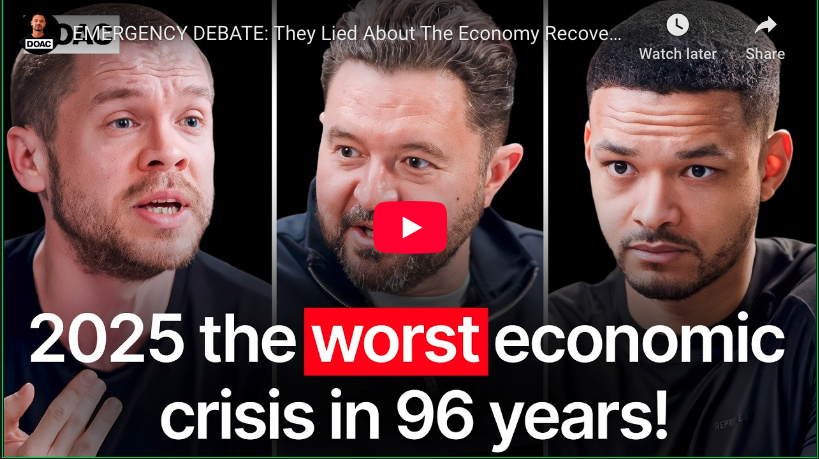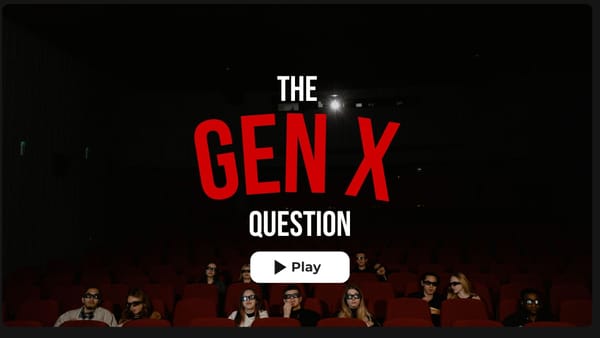The UK Growth Crisis: When Builders Leave and the Middle Breaks
The UK exodus edition...

The UK's economic narrative is being written in real time, but no one seems to agree on the plot.
In a must-listen episode of The Diary of a CEO, host Steven Bartlett sits down with two men who represent opposing ends of Britain’s economic argument.
On one side, Daniel Priestley, the entrepreneurial optimist who believes in the UK’s potential if we just empower its builders. On the other, Gary Stevenson, an ex-trader turned economist who sees inequality as the real villain behind Britain’s economic stagnation.
This was not a light debate. For the millions of founders, leaders and middle -class workers who feel they’re being punished for trying to get ahead - it was painfully familiar.
What’s Happening in the UK?
Gary Stevenson’s view is brutal but coherent: the middle class is being squeezed to death. Wealth is concentrating at the top, inflation is hammering real incomes and unless there's radical redistribution, Britain is heading for a slow collapse. He calls it a system that’s "designed to funnel wealth away from working people."
Daniel Priestley, however, is not buying the doom. He argues that many of the UK’s wounds are self-inflicted - but fixable. He argues the UK has amazing fundamentals, deep capital markets, strong rule of law, language, culture and talent. What’s broken is our attitude toward growth.
"We have a media and a political system that punishes ambition," he says, "and a tax system that penalises success."
They’re both right. But not completely.
Stevenson ignores the power of innovation and enterprise to lift people out of poverty. Priestley underestimates the systemic drag of a hollowed-out middle class. The problem isn’t just tax or inequality - it’s trust. And that’s evaporating fast.
But here’s the real tension in this debate - and why so many people sided with Gary Stevenson on TikTok.
The trap the UK finds itself in is this: as high earners leave and investment stalls, the state is left with fewer levers to pull. That makes it harder to fund services, invest in infrastructure or support those slipping through the cracks. The burden shifts downward and the middle class - already squeezed - begins to buckle.
Gary’s warning of a collapsing middle class isn’t just about fairness. It’s a macroeconomic red flag. When young professionals can’t afford homes, when working families can’t save and when the cost of living outpaces income growth, you don’t just get inequality - you get stagnation.
He’s not alone. The IMF has flagged the UK for falling living standards. The Resolution Foundation shows wages consistently trailing inflation. And while tax debates rage, millions are quietly burning out trying to keep up.
So here’s the paradox: Gary’s diagnosis and Daniel’s solution might both be true. Stevenson says inequality will collapse the system. Priestley says growth is the fix. But growth requires optimism, capital and belief in the system - and right now, none of those are in abundant supply.
The Labour narrative and its actions are not in either camp. Problem.
What do CEOs do?
That puts CEOs on the front line of a broken equation. How do you grow in a market where customers are poorer, the state is exhausted and your own middle-income staff are quietly struggling?
This is why leadership now must go beyond the P&L. CEOs will have to do what the state can’t - create belief again. That means better pay, more internal mobility and clearer progression.
Is the Grass Greener?
There’s a silent failure underpinning the UK’s millionaire exodus - and it’s not just tax policy. It’s communication.
While over 10,800 millionaires left the UK in 2024, there’s little sign anyone in government has asked them the most basic question: What would make you stay? A bit like an HR exit interview...
These individuals negotiate for a living, yet there’s no visible attempt to find a middle ground. As a result, countries like Portugal, Italy and Greece have stepped in with tailored offers - flat taxes, golden visas, lifestyle packages - and the UK has watched them leave, offering unpredictability, moralistic messaging and little else.
But it might not all be rosy on the other side either. The UAE, known for zero income tax, is now introducing a 9% corporate tax and even complying with the OECD’s global minimum tax. Yet it remains a magnet because it offers a growth culture. It moves fast, offers simplicity and ensures security.
So yes, taxation matters. But so does tone, safety and teamwork. And outcome. And for everyone concerned, whether they're rich or struggling to get by - so does being treated like an asset instead of a liability. Basic leadership 101.
Until we recognise that there is an active market for life quality and tax ROI, the exits will continue - not because the grass is greener, but because the gardener now lives in Uruguay with a business in Singapore.




